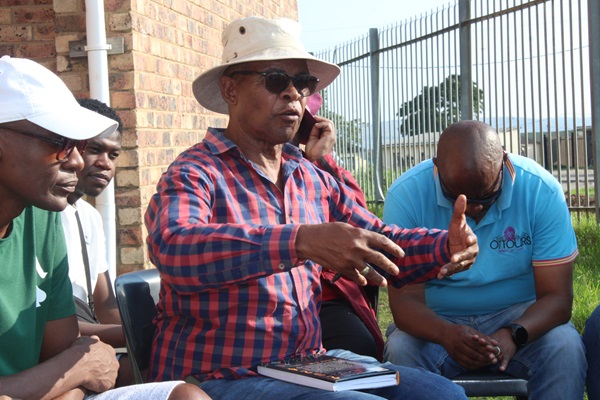By ‘Odidi Matai-Sigudla and Lehlogonolo Masuku
The local business sector is concerned about the dire unemployment situation in Makhanda.
Last week, the Makhanda Crisis Committee, the Unemployed Peoples Movement (UPM) and the Makhanda Business Forum met at Noluthando Hall to discuss solutions, including driving business through service delivery projects.
It started a few years ago when a local protest attracted the attention of then Transport MEC Weziwe Tikana-Gxotiwe, who deliberated with businesses. They reached an agreement
with the small, medium and micro enterprises (SMMEs) involved in the construction of the
road from Nathaniel Nyaluza High School to Joza, ending a three-day-long strike back in 2021.
However, it was dry again, and years passed without any sign of development.
“The provincial government, through [the Department of Cooperative Governance and Traditional Affairs], allocated a budget of R6 [million] for the Makana road, but [the money]was returned to public coffers,’’ said Ali Adams, interim chairperson of the Makhanda Crisis Committee.
The Makana Municipality is no stranger to returning funds – it is said that in the previous financial year, a portion of R66m meant for infrastructure projects was returned to the Treasury after allegedly not being spent.
“We are told that there is a company which has been earmarked for this road, and that was not the initial agreement,” said a member of the Makhanda Crisis Committee, stating that the municipality is outsourcing, thus negatively impacting local commerce.
According to the meeting, unemployment is at a peak, and the local projects stand to benefit both the local businesses and the youth. Adams explained: ‘’People are looking for anything they can find around to grab; for example, I see people every day passing in the early hours going to look for work.’’
The sentiment was that the primary purpose of such projects is to alleviate poverty, but such objectives are not always fully realised. “Because there is a consistently bad track record of the outside
contractors usually favoured by the municipality, they do not complete projects even after being allocated the necessary resources.”
The groups referenced a few projects, including the Makana Way next to the Indoor Sports Centre and the incomplete Oval fencing project. This further impacts local commerce, considering that job creation stalls. “It has been more than 25 years now that this council has neglected the community,”
expressed Adams.
He further said the community would not fold their arms and wait while outside companies were hired instead of local ones to benefit the people of Makhanda.
“The contractor chosen was a grade 3, according to the CIDB grader,” a concerned member of the business forum stated.
Many qualified local people had submitted but were declined, and instead, the municipality opted for the contractor in Mthatha, he said. He continued: “The unemployment rate here is around 75%. So, the SMMEs and local businesses around them could benefit from this project; why are you calling for someone outside, even the province, to come and dominate over us? Is it because of this money?”
“The municipality, they are mandated to be accountable by the community,” said another member. “If the community does not call them to account, what exactly are we expecting?”
The member continued: “We are the ones who are supposed to drive the municipality.”
Consequently, the people of Makhanda remain skeptical of being involved in such community-building meetings because they fear being isolated. They want to hold the municipality accountable, but at the same time, they do not want to step on the toes of certain powerful public officials. Some no longer have hope for any change since the municipality has been failing them for the longest time.
Furthermore, a suggested resolution from the meeting of 4 May, after consultation with relevant stakeholders, was concluded by initiating an action plan towards five identified issues: unemployment, water, infrastructure, sewage, and basic service delivery.
Significantly, the action plan will require a seating every two months to evaluate progress aims to hold the municipality accountable and prioritize community welfare, the meeting heard.
The narrative underscored a community’s determination to reclaim and demand equitable development opportunities. It served as a rallying call for local empowerment, transparency, and accountability in governance, essential for fostering sustainable growth and addressing longstanding socio-economic challenges.
Efforts to obtain comment from the municipality’s spokesperson were unsuccessful, as questions from Grocott’s Mail were unanswered.


